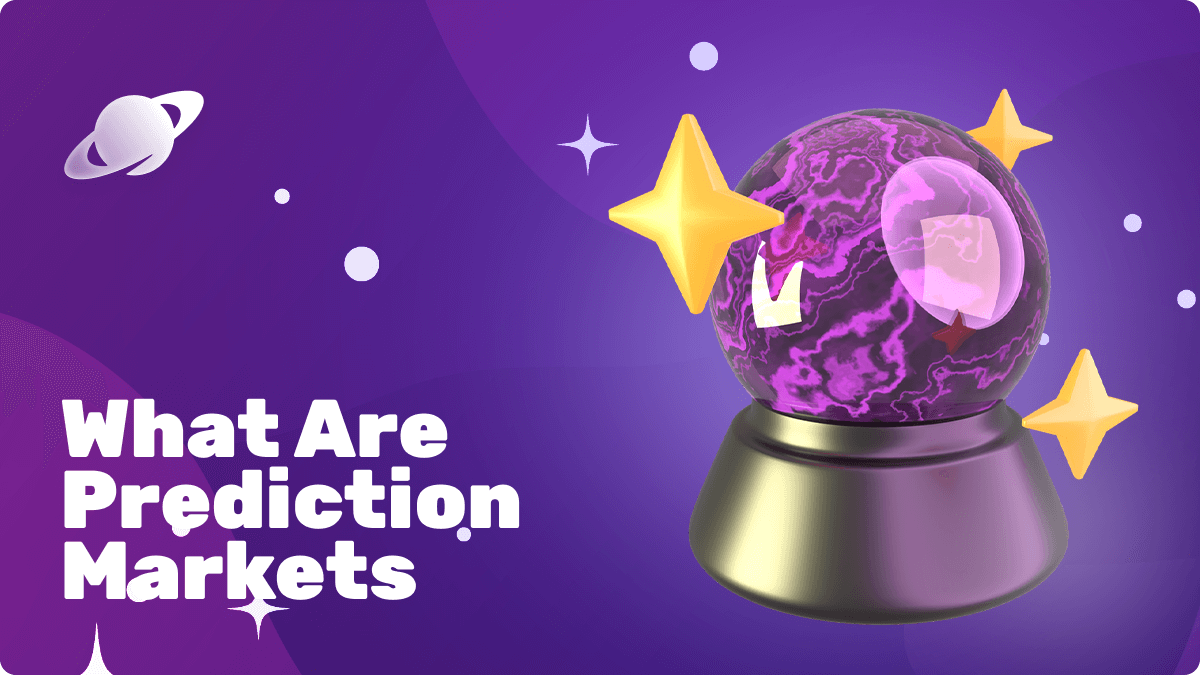Play Games and Earn LUCK.

Play Games and Earn LUCK.


Decentralized prediction markets are transforming the way we anticipate and forecast events, utilizing blockchain technology to create a secure, transparent, and intermediary-free environment for betting on various outcomes. With the upcoming U.S. presidential election on November 5, 2024, drawing considerable attention, now is the perfect time to dive into the leading decentralized prediction markets to watch in 2024.
These platforms, often referred to as web3 prediction markets, enable users to place bets on future events using cryptocurrencies. Unlike traditional prediction markets, these platforms operate on blockchain networks, ensuring enhanced transparency and security by eliminating the need for a central authority. This allows for global participation, making decentralized predictions markets accessible from anywhere in the world.
By aggregating the collective intelligence of participants, decentralized prediction markets provide valuable insights that can be applied to forecasting political events, economic trends, and even entertainment outcomes. As participation increases, the data becomes more reliable, reflecting the real-time sentiment of the market.
A decentralized prediction market is a blockchain-based platform where users can bet on the outcomes of future events using cryptocurrencies. In contrast to centralized markets, these platforms operate without a central authority, relying instead on blockchain technology to ensure transparency, security, and fairness. Participants can place bets on a wide range of events, including elections, sports matches, and economic indicators.
Smart Contracts: These are self-executing contracts that automatically enforce the terms of an agreement. In the context of prediction markets, smart contracts handle the execution of bets and payouts, removing the need for intermediaries.
Oracles: Oracles are services that fetch real-world data and relay it to the blockchain. They play a crucial role in ensuring that smart contracts receive accurate information regarding event outcomes.
Outcome Tokens: When a bet is placed, the participant receives tokens representing their prediction. The value of these tokens fluctuates based on market demand and supply until the event's outcome is determined.

Decentralized prediction markets use smart contracts to facilitate transactions. Here's a step-by-step look at how they work:
Market Creation: A user creates a market for a specific event, such as "Will Candidate A win the election?" This involves setting the parameters for betting options "Yes" or "No."
Placing Bets: Participants buy shares in the outcome they believe will occur. For example, if you think Candidate A will win, you buy "Yes" shares. The price of these shares reflects the current market consensus on the likelihood of the event.
Outcome Determination: Once the event occurs, the outcome is confirmed by blockchain oracles. Oracles are third-party services that provide real-world data to the blockchain, ensuring the event result is correctly recorded.
Settlement: The smart contract automatically distributes the funds to those who bet on the correct outcome. If you bought "Yes" shares and Candidate A wins, you receive a payout based on the number of shares you hold.

Decentralized prediction markets offer several benefits, making them increasingly popular in the blockchain space:
Censorship Resistance: Unlike traditional platforms that can be censored or shut down by authorities, decentralized prediction markets operate on blockchain networks, making them resilient to external control. This ensures a reliable and open platform for all users.
No Intermediaries: Decentralized prediction markets remove the need for intermediaries, as transactions such as payments are executed directly through smart contracts. This reduces costs and minimizes the risk of fraud or human error.
Global Accessibility: These platforms are open to anyone with an internet connection. Traditional prediction markets may impose high fees or regional restrictions, but decentralized platforms are permissionless, allowing for global participation and a richer diversity of insights.
Enhanced Transparency: Decentralized prediction markets also provide greater transparency. All transactions and market activities are recorded on the blockchain, allowing anyone to audit the results. This transparency builds trust among users. Additionally, blockchain oracles ensure the accuracy of event outcomes, further boosting the reliability of these markets.

Blockchain oracles are essential to the functioning of decentralized prediction markets. They act as bridges between the blockchain and external data sources, providing the information needed to execute smart contracts. Oracles can deliver data on various events, from sports scores to election results, weather conditions and more – ensuring that the prediction markets operate based on accurate, real-world information.
Oracles utilize multiple verification methods to ensure the data they provide is trustworthy for the prediction markets. Some oracles incentivize accurate reporting by rewarding users who provide truthful data and penalizing those who do not. By gathering information from various reputable sources and using consensus mechanisms, they minimize the risk of tampering. This decentralized approach to data collection eliminates single points of failure, enhancing the security and trustworthiness of the prediction market.
While decentralized prediction markets have significant potential, they also face several challenges. Here are some of the challenges and future opportunities to know:
Scalability Issues: Scalability remains a major challenge for decentralized prediction markets. Current blockchain networks can struggle with high transaction volumes, leading to slower processing times and increased fees. Solutions like layer-2 scaling and rollups are being developed, they are not yet widely implemented.
Regulatory Uncertainty: Regulatory challenges is another significant hurdle. Prediction markets can be classified as gambling in some jurisdictions, leading to legal complications. As these markets grow, they are likely to face increased regulatory scrutiny, making the establishment of clear and supportive frameworks essential.
Integration With DeFi: Integrating prediction markets with other decentralized finance (DeFi) applications presents both opportunities and challenges. Such integrations could lead to innovative financial products, but achieving seamless interoperability between different blockchain platforms requires advanced technical solutions and collaboration within the blockchain community.
From non custodial ones it is Predchain then there is Rollspace, Polymarket, Augur and many others but those require you to deposit funds into platform but could have better UX as they do not require approve transactiosn further...
Decentralized prediction markets represent a significant advancement in how we predict future events, offering a transparent, secure, and accessible platform powered by blockchain technology. Oracles play a pivotal role in ensuring the accuracy of the data used in these markets, and despite challenges such as scalability and regulatory issues, the future of decentralized prediction markets appears promising.
As blockchain technology continues to evolve and regulatory frameworks adapt, decentralized prediction markets are likely to become more efficient and widely adopted. Improved scalability and deeper integration with other DeFi applications will further enhance their utility, making them valuable tools for harnessing the collective intelligence of participants and driving innovation across various sectors.
However, participants should remain aware of the risks involved, including market volatility, legal uncertainties, and the accuracy of data provided by oracles. Thorough research and a clear understanding of these risks are crucial before engaging in decentralized prediction markets.
What is a DeFi prediction market?
What is an example of a prediction market?
How do crypto prediction markets work?
What is a decentralized prediction market platform?